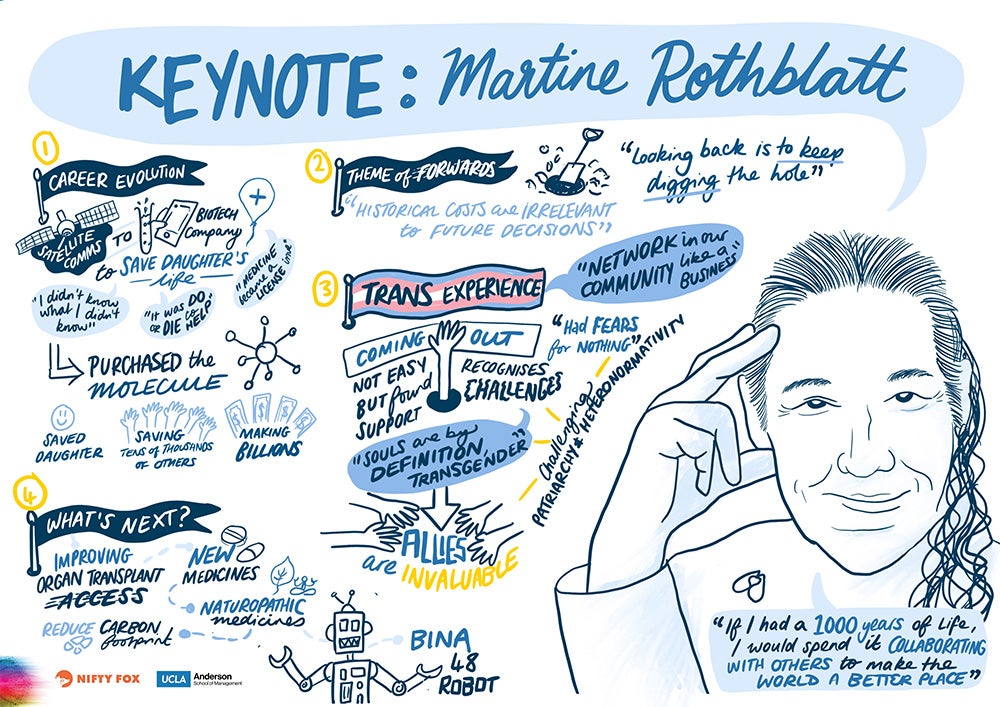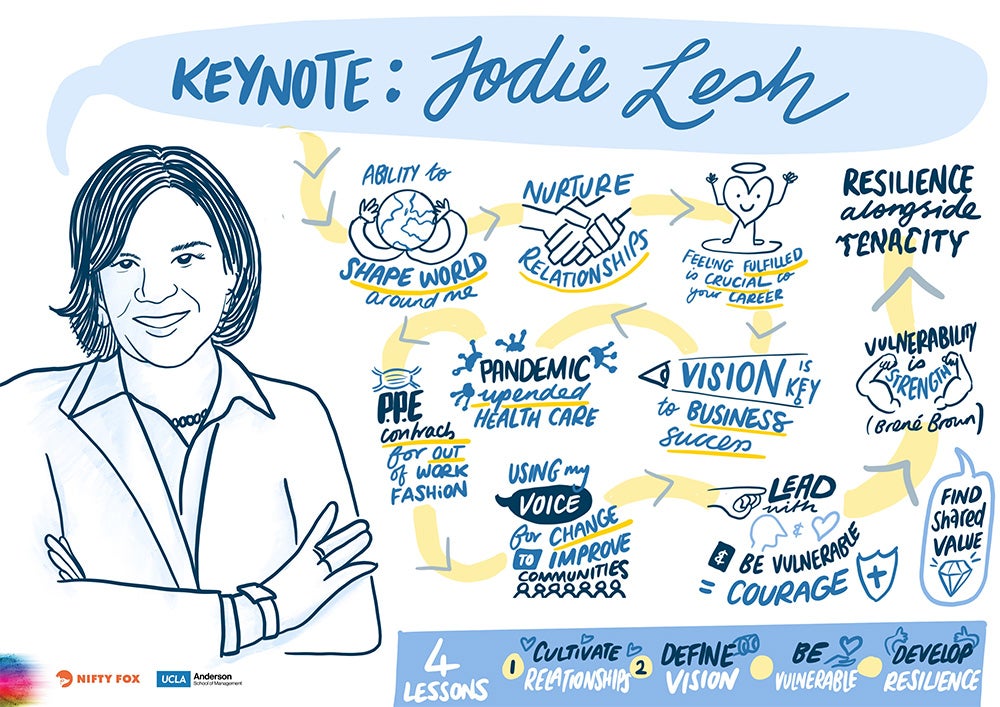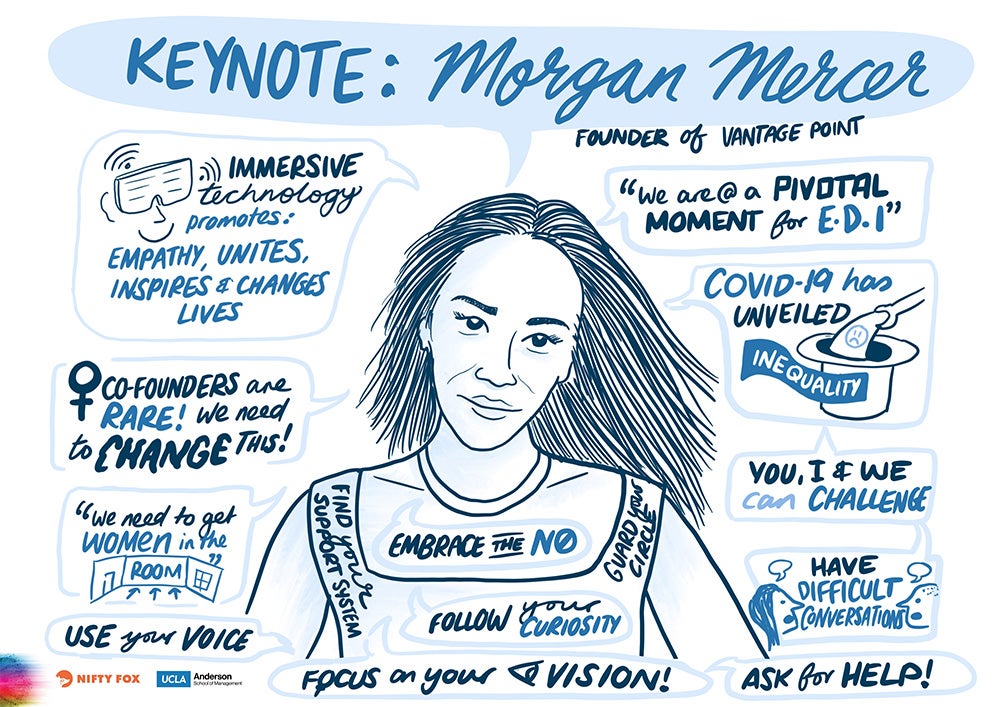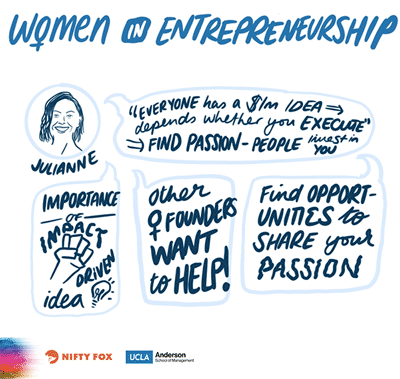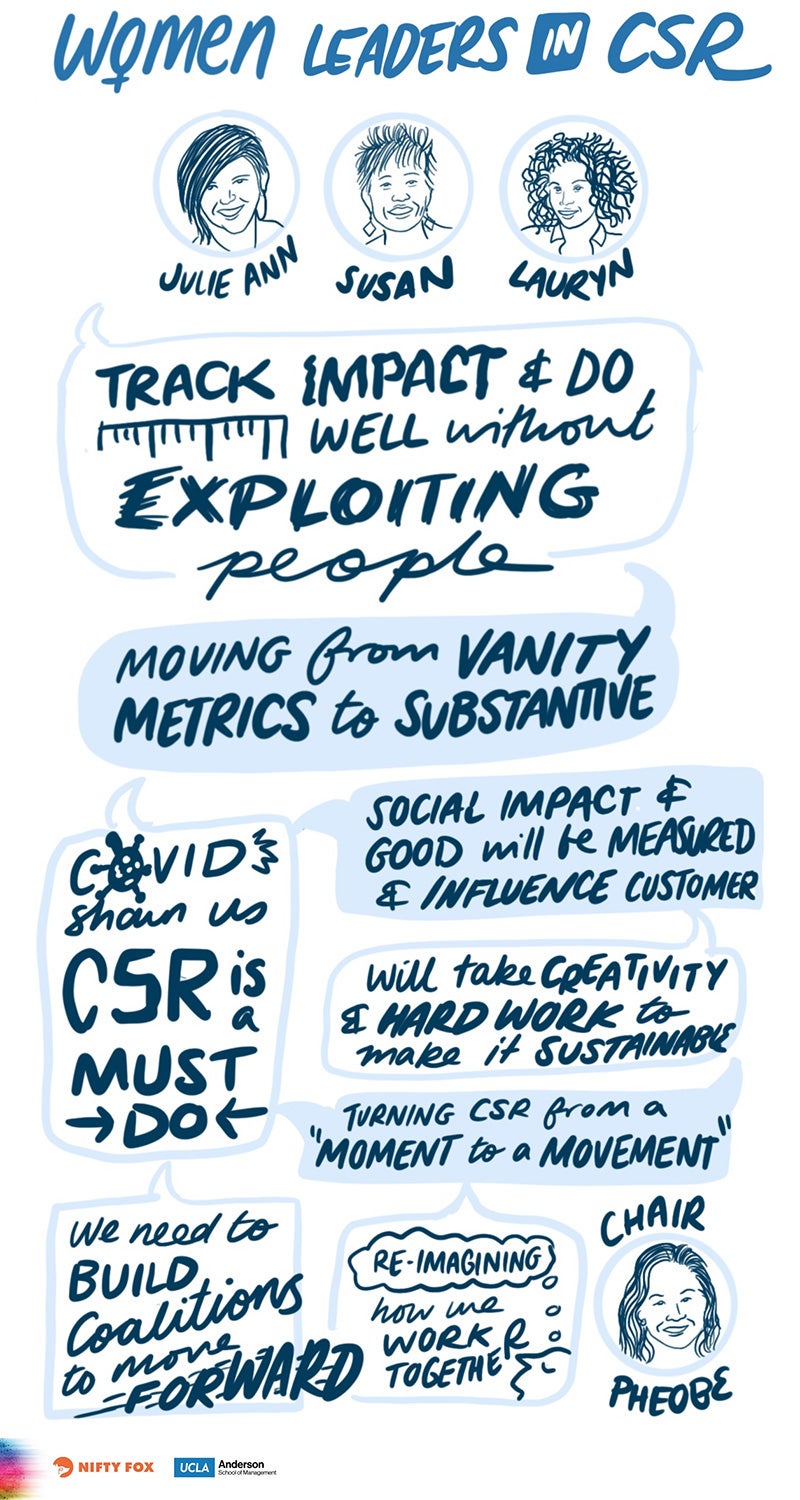Fast Forward, from Moment to Movement
Fast Forward, from Moment to Movement
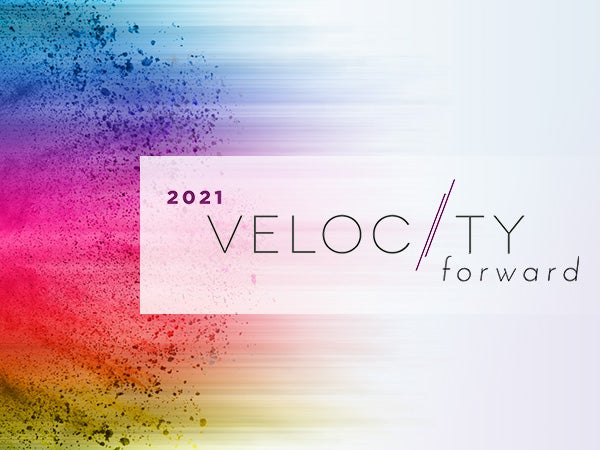
A day-long celebration of the power and impact of women brought together current and future leaders of all backgrounds to explore ideas for a more equitable future in business and society.
UCLA Anderson’s 2021 Velocity Women’s Leadership Summit brought our community together to foster a sense of belonging and empower women. Motivated by the unprecedented events of 2020, we convened under the theme Forward, celebrating and recognizing those who create positive change and propel women forward through the challenges we face today. Our team worked to adapt Velocity to an engaging virtual format in which we could actively involve attendees in important conversations, and we reached more people than ever — including the largest number of allies for Velocity that Anderson has ever seen. It was a crucial step for us to achieve forward velocity.
Attendees learned from remarkable leaders — including UCLA Anderson Board of Advisors chair Caroline Nahas (B.A. ’70), longtime senior advisor at global organizational consulting firm Korn Ferry and the firm’s first woman to become partner — about breaking gender stereotypes, finding strength in vulnerability and creating an equitable and just world. In some form, each speaker touched on the idea of using our voices to work together, and participants left feeling energized to amplify women’s voices and champion future generations of women business leaders.
Passionate and forward-thinking student leaders in the Women’s Business Connection reflected on the day, and we were inspired to uplift and tap into the potential and power of women and other individuals who identify with marginalized communities to move society forward.
Thank you to all who joined us virtually!
— Jaanhvi Vaidya (’21), President, Women’s Business Connection
Watch Video
Among Dr. Martine Rothblatt’s innumerable achievements is the biotechnology company she founded for the express purpose of saving her daughter’s life. Well into her career, Rothblatt started from scratch to educate herself in biology and chemistry and was able to launch and license the pulmonary hypertension drug that saved her own child as well as tens of thousands of people suffering around the world. “If I’d known what I didn’t know,” she said, “I might have been too scared to even try.”
The Women’s Business Connection was proud to invite Rothblatt, chairman and CEO of United Therapeutics, for a moderated discussion about her career evolution, from satellite radio inventor to biopharma pioneer. Rothblatt, who said her mantra is “forward,” described how she has thought about moving the needle throughout her life and how her UCLA education has informed every phase of her career. An advocate for transgender rights, Rothblatt has led efforts in the transgender community to establish health and law standards. She encouraged members of the audience who are struggling to be their true, authentic selves to find allies in the LGBTQ+ community and seek out a support system.
Watch Video
UCLA Anderson alumna Jodie Lesh, chief transformation officer for Kaiser Permanente, innovates well beyond the current pace of change to meet both human and business needs. Welcomed by the Women’s Business Connection to deliver a keynote address, Lesh shared how her approach highlights radical collaboration and agility, and has led to new initiatives such as Food for Life, Kaiser Permanente’s strategy to address food insecurity. Lesh turned her passion into a profession and advocates for the importance of purpose in advancing one’s career. After a dramatic change in her life altered the course of her career, Lesh had to figure out how to be resilient while navigating a new role that focused on keeping people safe and supporting health care workers during the pandemic. She is known to push the boundaries at work, taking risks that address systematic symptoms of social need — like employing previously incarcerated apprentices to build a Kaiser Permanente facility. Lesh advised the audience to take stock of why they have performed well in the past and what it would mean to be successful again.
Watch Video
The Women’s Business Connection welcomed Morgan Mercer, founder of the immersive enterprise training company Vantage Point, to the Velocity stage for the final keynote address. Vantage Point’s training platform leverages standalone virtual reality in conjunction with machine learning and artificial intelligence. It offers training modules focused on soft skills development, including workplace harassment training, anti-racism and diversity and inclusion training. The discussion focused on how this type of technology can help break the stigma around complex social issues that filter in and out of our interactions every day to shift cultural norms. Mercer has been working to break barriers around racial and gender inequities, challenging the audience to be the best versions of ourselves and come together to promote a more equitable and just world. Mercer also challenged participants to embrace difficult conversations and to share more, saying we need to question our assumptions and not take the easy path. She talked about the importance of finding a strong support system through friends, mentors, allies and other outlets.
Watch Video
The Women’s Business Connection had the pleasure of hosting triple Bruin Melanie Ho (B.A. ’01, M.A. ’05, Ph.D. ’08) to lead a pre-conference workshop on allyship. Author of Beyond Leaning In: Gender Equity and What Organizations are Up Against and founder of Strategic Imagination, Ho has conducted research on the importance of allyship across genders and generations. The discussion dove deep into topics encompassing the generation gap, mental “autocompletes,” and intent versus impact. Ho broke down her definition of allyship into three key principles:
- The importance of understanding the lived experiences of our colleagues and how their experiences may be different from ours
- Finding ways to overcome barriers imposed by these differences
- How allyship must occur in all directions to be successful and impactful
She encouraged participants to recognize the complexity that comes with gender inequity, stressing the importance of not looking to oversimplify these issues, but rather acknowledge that intersectionality is critical to becoming a strong ally to all underrepresented groups.
The Women Creating Change panel, hosted by Women’s Business Connection, illuminated how some women are moving the world forward. The panelists — Aida Davis, founder of Decolonize Design; Daryl Drabinsky, senior vice president of digital at Weber Shandwick; Bailey Richardson, partner at People & Company and co-author of Get Together: How to Build a Community with Your People; and moderator Wendy Spinner (’89), vice president of UBS Private Wealth Management – The Spinner Group — opened by sharing their and their loved ones’ experiences of the very real and vivid hurt unfairness causes, which is what inspired them to become agents of change.
These are women who hope to make the world a better place, not only for themselves or for the next generation, but for many generations to come — “for people we will never meet,” as they said. Throughout the discussion, each panelist painted a vision of the world she is working to create:
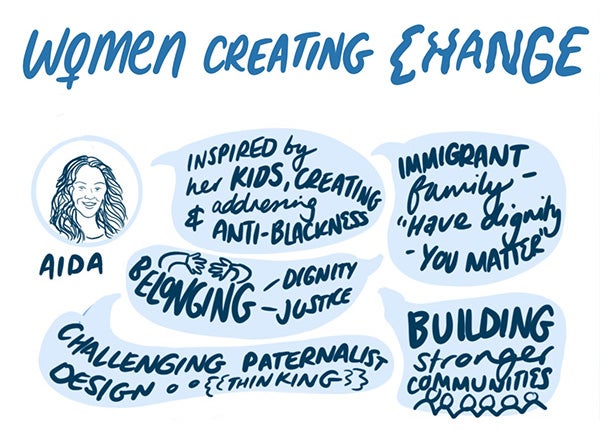
Davis described her work to challenge traditional approaches to equity, diversity and inclusion that often fall short. She incorporates African and indigenous approaches to build communities founded upon belonging, dignity and justice.
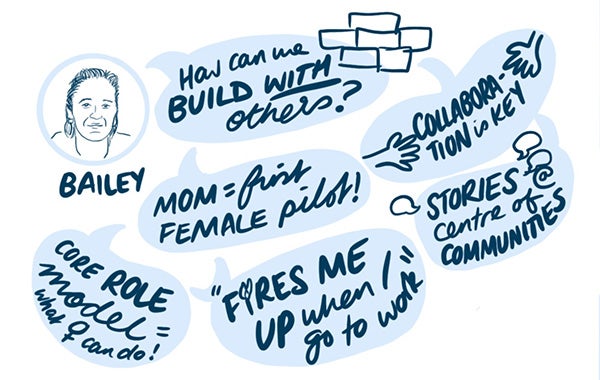
Richardson spoke about her mission to help organizations build true, genuine communities with people rather than for people. In a world where so much focus is placed on metrics (the number of subscribers, likes or followers), Richardson believes that true, genuine community often comes in much smaller numbers; and it’s the small group of individuals you interact with that replenishes you and fuels you up.
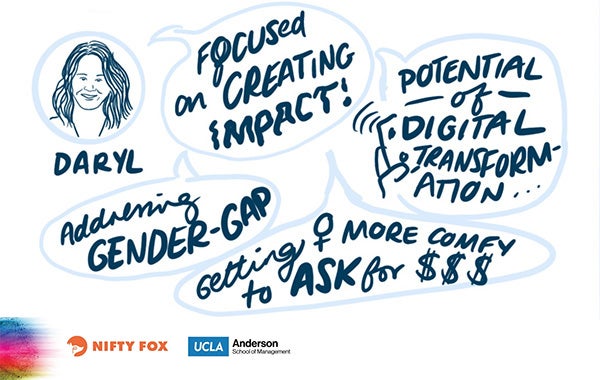
Drabinsky shared her experiences in senior leadership at her PR firm and as a founding member of Chief Los Angeles, a private network built to drive more women into positions of power and keep them there. She discussed the need for more women to hold executive leadership positions in a world still largely run by businesses disproportionately led by men. She engaged in open and honest dialogue regarding the need for women to not shy away from discussing their salaries, and to find partners and a community of people who will truly help and support them in achieving goals.
The Women’s Business Connection was gratified by the support of Anderson alumnus Fritz Demopoulos (’97), who presented the annual entrepreneurship panel: Julianne Hough, CEO and founder of KINRGY; Julie Uhrman (’04), founder and president of Angel City Football Club; Jovanna Youssef (’16), director of product marketing and customer strategy at Rent the Runway; and moderator Pamela Dressler (’97), president and managing director of Emmi California. At various stages of their entrepreneurship journeys, these women are driving their industries forward.
The panel began with a discussion on navigating transitions. Hough said, “I’ve been creating my whole life. I just didn’t realize that was a form of entrepreneurship.” When the panelists discussed the key to an entrepreneurial career, Youssef added her perspective, saying, “Finding a function, industry or product that you’re very passionate about will make a world of a difference.” The conversation turned to the importance not only of financial capital, but also human capital. Uhrman advised, “Don’t look to others to do what it is you want to do, because then you’re just going to be stymied.”
The panelists agreed that entrepreneurs hear “no” more often than “yes,” so it’s vital to believe in yourself and surround yourself with a support system. They shared their insights on how entrepreneurs should get started. Uhrmann said, “The idea is finding your strengths and knowing your weaknesses as well, and realizing that you don’t have to do it all — you just have to find the right team to support the trifecta of the visionary, the entrepreneur and the manager. Determine how to get that trifecta so that you can stay in what makes you creatively fulfilled.” Youssef added, “If you have an early idea, think about it from the customer lens. Just go ahead and talk to people. Find ways of scrappily testing your ideas.” Hough’s wisdom on pitching ideas was to see it as “an opportunity for me to share what I’m so passionate about, versus ‘I have to go into this room and they need to like me and get me.’”
The discussion ended on the topic of not only protecting yourself from burnout but also recognizing what burnout looks like to you. Step away when you need to and your business will be better for it. As Hough said, “On the human side, make sure that you’re balancing the execution with the nurture. If you’re not okay then your company isn’t okay. Put the oxygen mask on yourself first, that way your company can thrive.”
To drive CSR initiatives forward, it is important to set the tone at the corporate helm. Anderson’s Women’s Business Connection invited a panel of women leaders in corporate social responsibility to a conversation reflecting the role of business in creating positive change for society. The panel was moderated by UCLA Anderson alumna Phoebe A. Wood (’80), principal at CompaniesWood, and featured: Julie Ann Crommett, former vice president of multicultural audience engagement at Walt Disney Studios; Susan Jin Davis, former chief sustainability officer at Comcast NBCUniversal; and Lauryn Nwankpa, head of social impact for the banking app Dave.
The panelists each provided their definition of what corporate social responsibility means to them. They enumerated best practices of measuring social impact results and stressed the importance of accountability that can come from these metrics. “We can’t do well by being predatory,” said Nwankpa. “Demand leadership take responsibility for social benefit.”
Throughout the conversation, the panelists underscored the importance of centering all social impact programs within the community that they are intended to support. They agreed that equity, diversity and inclusion initiatives aren’t just the right thing to do, EDI has been shown time and time again to be good for business. Corporate social responsibility is no longer a “nice-to-have,” it’s a necessity. All businesses should be thinking about how they can holistically use their resources to better their communities, their people and the planet. “We’re going from a moment to a movement that requires sustainability of thought and strategy,” said Crommett.
